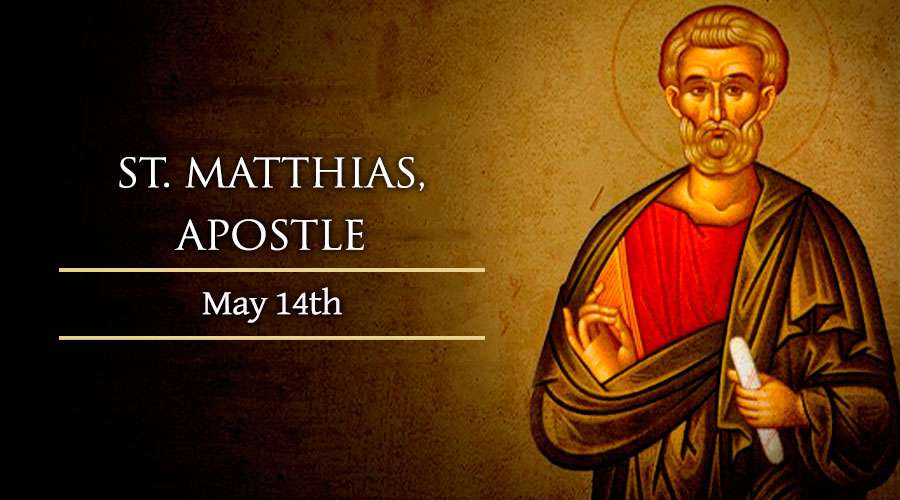
About the Commemoration
Matthias was a late addition to the apostolic company to replace Judas and to restore the apostolic college to its full complement of twelve, representing the twelve tribes of Israel and the fullness of God’s praise. The feast day itself was a late addition to the calendar.
Nothing is known for certain of the life of Matthias except for the account of his selection to replace Judas Iscariot, as recorded in the second reading, Acts 1:25-26. After Jesus’ ascension, when about 120 of the followers of Jesus met in the upper room, Peter asked the group to choose a replacement for Judas, the betrayer of the Lord. Two witnesses of the resurrection were suggested, a certain Joseph Barsabbas, also known as Justus, and Matthias. The report of the choice of Matthias includes a condemnation of Judas, demonstrating the twofold authority of the church: speaking confidently the word of commendation as also with equal confidence the word of judgment.
Tradition has included both Joseph-Justus and Matthias among the seventy disciples sent out by Jesus, but neither is mentioned elsewhere than in Acts 1. After a prayer, the choice was left to the casting of lots, and Matthias became the twelfth apostle. St. Paul (1 Cor. 15:5-6) refers to a resurrection appearance of Jesus to “the Twelve”; Origen thought that this number included Matthias.
There has been some confusion in the apocryphal literature between Matthias and Matthew. Clement quotes a second-century Gospel of Matthias, now lost A sixth-century “Acts of Andrew and Matthias (Matthew)” relates that the land of the cannibals fell to Matthias as the sphere of his missionary activity; an Old English poem, Andreas, tells the tale. There are stories of Matthias preaching in Judea and in Ethiopia, and one tradition asserts that he met his death in Colchis, near modem Georgia in the Caucasus. All the traditions at least agree that he was a martyr for the faith. His symbol, reflecting one of the traditions, sometimes appears as a double-headed axe resting on a Bible. His feast day was one of the last of the apostles’ days to be added to the calendar, not dating back before the eleventh century. One reason for the late establishment of his feast day is that St. Paul was long thought to have been the one chosen to replace Judas and to restore the complement of twelve.
The reason for the traditional date of February 24 is not known. In the present Roman calendar, St. Matthias’s day is moved to May 14 to avoid conflict with Lent and to place the commemoration in the Easter season, emphasizing Matthias’s role as a witness to the resurrection; Evangelical Lutheran Worship has done the same. Other Lutheran churches and Anglicans retain the traditional Western date. In the Eastern Churches St. Matthias’s Day is celebrated on August 9.
Excerpts from New Book of Festivals & Commemorations: A Proposed Common Calendar of Saints by Philip H. Pfatteicher, copyright, 2008 by Fortress Press, an imprint of Augsburg Fortress.
See also: Saint Matthias
Reading
From Luther’s Lectures on Galatians (1519)
…Christ wanted no one to be made an apostle by men or the will of men but as the result to a call from Him alone. For this reason the apostles did not dare elect Matthias; they gained his appointment from heaven in answer to their prayer. And it was from heaven that God called Paul himself and made him an apostle, in particular through the voice of the Holy Spirit. “Set apart for Me,” He says, “Paul and Barnabas for the work to which I have called them.” Thus Paul boasts in Rom. 1: If. that he was set apart for the Gospel of God, inasmuch as he himself, together with Barnabas, was set apart for the uncircumcised and the Gentiles, while the rest of the apostles were sent to those who were circumcised.
Note also that Paul makes the name “apostle” so emphatically expressive of an office and of dignity that he uses it as a participle and says “an apostle, not from men,” which means “sent, not from men”…. All these facts aim to make you see with what care Christ has established and fortified His church, lest anyone rashly presume to teach without being sent by Him or by those whom He has sent. For just as the Word of God is the church’s first and greatest benefit, so, on the other hand, there is no greater harm by which the church is destroyed than the word of man and the traditions of this world. God alone is true, and every man a liar. Finally, just as David once left behind all the means by which Solomon was to build the temple, so Christ has left behind the Gospel and other writings, in order that the church might be built by means of them, not by human decrees.
“Lectures on Galatians,” in Luther’s Works Vol. 27 © 1964, 1992 Concordia Publishing House. Used with permission.
Propers
Almighty God, who in the place of Judas chose your faithful servant Matthias to be numbered among the Twelve: Grant that your Church, being delivered from false apostles, may always be guided by faithful and true pastors; through Jesus Christ our Lord, who lives and reigns with you and the Holy Spirit, one God, now and forever.
BCP (1549); alt. in LBW, ELW
Readings: Acts 1:15-26; Psalm 15; Philippians 3:13-21; John 15:1, 6-16
Hymn of the Day: “O Zion, haste, your mission high fulfilling” (H82 539, LBW 397, ELW 668)
Prayers: For those who give testimony to the resurrection; For a renewed life; For faithfulness to Christ; For those who are passed over in selection processes.
Preface: Apostles
Color: Red
